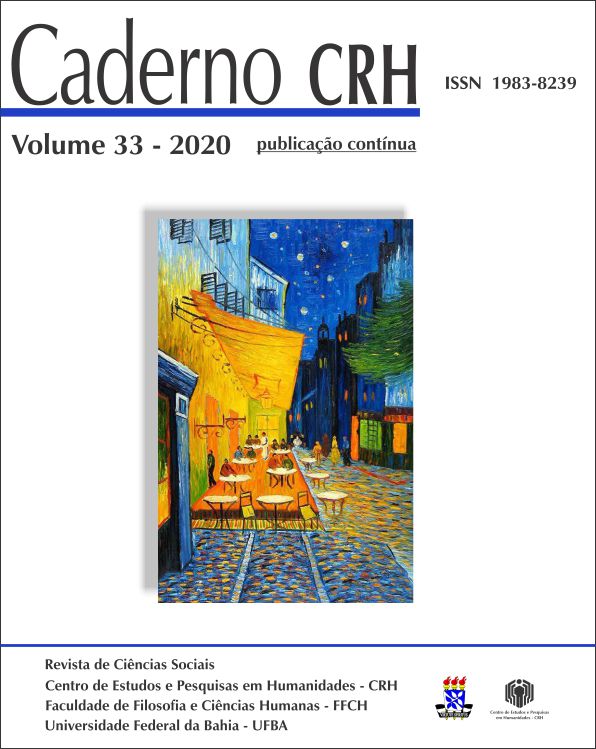JUDITH BUTLER E HANNAH ARENDT VÃO AO CINEMA: narrativa, psicanálise e subjetivação no filme “Eu, Mamãe e os Meninos”
DOI:
https://doi.org/10.9771/ccrh.v33i0.35459Palabras clave:
Hannah Arendt, Judith Butler, Subjetivação, Psicanálise, NarrativaResumen
Neste artigo, proponho uma análise do filme Eu, Mamãe e os Meninos (Les garçons et Guillaume, à table! Direção: Guillaume Gallienne. França, 2013) tendo-se em vista uma perspectiva política e relacional das conexões entre psicanálise, narrativa e processo de subjetivação. Minha inspiração para isso está no modo como Judith Butler articula essas dimensões em seu livro Relatar a Si Mesmo: Crítica da Violência Ética ([2005], 2015), no qual a autora propõe uma teoria da formação do sujeito em que a concepção de narrativa de Hannah Arendt cumpre um papel fundamental, depois de ser reformulada pela concepção de self narrável de Adriana Cavarero e combinada à metapsicologia relacional de Jean Laplanche. Desse modo, meu objetivo é convidar Butler e Arendt ao cinema para depois discutir a relação entre narrativa, psicanálise e subjetivação tendo em vista o vínculo entre ética e política que a estória que o personagem Guillaume nos conta sobre quem é pode inspirar.
Palavras-Chave: Hannah Arendt; Judith Butler; Subjetivação; Psicanálise; Narrativa
JUDITH BUTLER AND HANNAH ARENDT GO TO THE MOVIES: narrative, psychoanalysis and subjectification in the film Me, Myself and Mum
ABSTRACT
In this article, I propose an analysis of the film Me, Myself and Mum (Les garçons et Guillaume, à table! Directed by Guillaume Gallienne. France 2013) with a view to a political and relational perspective of the connections between psychoanalysis, narrative and subjectivation process. My inspiration for this is in the way Judith Butler articulates these dimensions in her book Giving an Account of Oneself (2005). In this work, Butler proposes a theory of the formation of the subject in which Hannah Arendt’s conception of narrative plays a fundamental role, after being reformulated by Adriana Cavarero’s conception of narrable self and combined with Jean Laplanche’s relational metapsychology. In this text, my goal is to invite Butler and Arendt to the movies to later discuss the relationship between narrative, psychoanalysis and subjectivity in view of the link between ethics and politics that the story in which Guillaume tells us about who he is can inspire.
Key words: Hannah Arendt; Judith Butler; Subjectivation; Psychoanalysis; Narrative
JUDITH BUTLER ET HANNAH ARENDT VONT AU CINÉMA: narration, psychanalyse et subjectivation dan le film Les Garçons et Guillaume, à table!
ABSTRACT
Dans cet article, je propose une analyse du film Les Garçons et Guillaume, à la Table (Realisation Guillaume Galliene, France, 2013) en vue d’une perspective politique et relationnelle des liens entre psychanalyse, narration et processus de subjectivation. Mon inspiration pour cela réside dans la façon dont Judith Butler articule ces dimensions dans son livre Le Récit de Soi (2005). Dans ce travail, Butler propose une théorie de la formation du sujet dans laquelle la conception de la narration d’Hannah Arendt joue un rôle fondamental, après avoir été reformulée par la conception d’Adriana Cavarero du soi narrable et combinée avec la métapsychologie relationnelle de Jean Laplanche. Dans ce texte, mon objectif est d’inviter Butler et Arendt au cinéma pour discuter plus tard de la relation entre narration, psychanalyse et subjectivité au vu du lien entre éthique et politique que l’histoire dans laquelle Guillaume nous raconte qui il est peut inspirer.
Key words: Hannah Arendt; Judith Butler; Subjectivation; Psychanalyse; Narrative
Descargas
Descargas
Publicado
Cómo citar
Número
Sección
Licencia
Todo o conteúdo da revista, exceto onde indicado de outra forma, é licenciado sob uma atribuição do tipo Creative Commons BY.
O periódico Caderno CRH on-line é aberto e gratuito.





